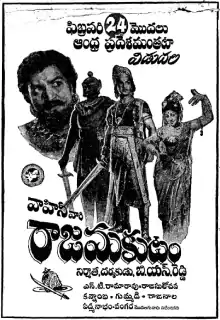Raja Makutam
Raja Makutam (transl. The Royal Crown) is a 1960 Indian swashbuckler film, produced and directed by B. N. Reddy under the Vauhini Studios banner. Filmed simultaneously in Telugu and Tamil languages, it stars N. T. Rama Rao and Rajasulochana , with music composed by Master Venu.[1][2]
| Raja Makutam | |
|---|---|
 Theatrical release poster | |
| Directed by | B. N. Reddy |
| Produced by | B. N. Reddy |
| Written by | D. V. Narasa Raju (story / dialogues) B. S. Ramaiah (Tamil) |
| Screenplay by | B. N. Reddy Padma Raju B. S. Ramaiah |
| Starring | N. T. Rama Rao Rajasulochana |
| Music by | Master Venu |
| Cinematography | B. N. Konda Reddy |
| Edited by | Raja Mani Vaasu Mani |
Production company | |
Release date | 24 February 1960 |
Running time | 179 minutes |
| Country | India |
| Language | Telugu Tamil |
Plot
During the time of a festival, the King of Gandhara was killed by his younger brother Prachanda (Gummadi) the army commander of the kingdom. At that time, the Prince Pratap (N. T. Rama Rao) was away, comes to know about his father's death and returns to the kingdom. On the way, Prachanda makes an unsuccessful attempt to eliminate the prince, Pratap in order to place his son Bhajaranga (Padmanabham) on the throne, where he is wounded. While he is unconscious, a girl Pramila (Rajasulochana) belonging to a rebel group takes him to the palace on her cart. Believing his uncle Prachanda's words, Pratap orders the execution of a few persons held responsible for his father's murder and they include Pramila's brother and rebel leader Soorasena (Rajanala)’s father. Pramila vows to kill Pratap not knowing the Paradesi she met and Pratap are one and the same. Meanwhile, Pratap learns that Prachanda was responsible for his father’s death. His mother (Kannamba) restrains him from taking revenge immediately and advises him to first win the people’s confidence and set up an army to fight the powerful Prachanda. The cloak and dagger drama follows. Pratap acts as a madman, disguises himself as a black cobra, leads the rebel gang, kills Prachanda, ascends the throne and marries Pramila.
Cast
Telugu
- N. T. Rama Rao as Prince Pratapa Simha
- Rajasulochana as Prameela
- Kannamba as Queen Mother
- Gummadi as Prachanda
- Rajanala as Soorasena
- Padmanabham as Bhajaranga Simha
- Kasturi Siva Rao as Shambhu
- Vangara
Tamil
The list is adapted from Film News Anandan's database.[2]
- N. T. Rama Rao
- Rajasulochana
- Kannamba
- V. R. Rajagopal
- Chittor V. Nagaiah
- S. V. Sahasranamam
- K. Balaji
Soundtrack
Music is by Master Venu. There are about 11 songs in the film.[3]
Telugu Songs
Lyrics were by Balantrapu Rajanikanta Rao, Devulapalli Krishnasastri and Kosaraju Raghavaiah.[1] Playback singers are Ghantasala, Madhavapeddi Satyam, Mallik, P. Leela, P. Susheela and Jikki.
| No. | Song | Singers | Lyrics | Length (m:ss) |
|---|---|---|---|---|
| 1 | "Anjalide Janani Devi" | P. Leela | 02:52 | |
| 2 | "Edanunnado Ekkadunnado Naa Chukkala Redu" | P. Leela | 03:44 | |
| 3 | "Eti Odduna Maa Vooru" | Jikki | 03:28 | |
| 4 | "Jaya Jaya Manogna Mangala Murthi" | P. Susheela | 08:35 | |
| 5 | "Ninu choosi Neeli.... Ooredi Peredi O Chandamama" | Ghantasala & P. Leela | Balantrapu Rajanikanta Rao | 04:31 |
| 6 | "Sadiseyako Gali Sadiseya Boke" | P. Leela | Devulapalli Krishnasastri | 03:16 |
| 7 | "Takita Takita Dhimi Tabala" | Ghantasala | Kosaraju Raghavaiah | |
| 8 | "Kanta Paini Aasa" | Madhavapeddi Satyam & Mallik | 02:05 | |
| 9 | "Jingana Tingana" | 03:10 | ||
| 10 | "Raarandoyi" | 02:34 | ||
Tamil Songs
Lyrics were penned by Thanjai Ramaiah Dass. Playback singers were Thiruchi Loganathan, P. Leela, Sirkazhi Govindarajan, A. L. Raghavan and Jikki.[4]
| No. | Song | Singers | Length (m:ss) |
|---|---|---|---|
| 1 | "Maadapurave Odi Varuvaaya" | P. Leela | 02:31 |
| 2 | "Konji Varum Thendrale" | ||
| 3 | "Amba Jagadhamba" | ||
| 4 | "Munnale Povanum Thirumbalaama" | Sirkazhi Govindarajan | |
| 5 | "Iravinil Vandhadheno...Ooredhu Peredhu O Vennilaave" | Seerkazhi Govindarajan & P. Leela | 04:31 |
| 6 | "Vacha Pulliyum Thavaraadhu" | Jikki | |
| 7 | "Gumthala Gumma" | 03:28 | |
| 8 | "Vaarungo Vaarungo Vaarungo" | Thiruchi Loganathan | |
| 9 | "Kelaayo Kadhaiyai Nee" | A. L. Raghavan | |
| 10 | "Thakita Thimi" | Seerkazhi Govindarajan | 03:38 |
References
- Narasimhan, M. L. (11 February 2016). "Rajamakutam (1960)". The Hindu. Archived from the original on 12 March 2017. Retrieved 12 February 2017.
- Film News Anandan (23 October 2004). Sadhanaigal Padaitha Thamizh Thiraipada Varalaru [History of Landmark Tamil Films] (in Tamil). Chennai: Sivakami Publishers. Archived from the original on 12 March 2017.
- "Raja Makutam (1960)-Song_Booklet". Indiancine.ma. Retrieved 24 December 2020.
- G. Neelamegam. Thiraikalanjiyam – Part 2 (in Tamil). Manivasagar Publishers, Chennai 108 (Ph:044 25361039). First edition November 2016. p. 212.
External links
- Raja Makutam at IMDb